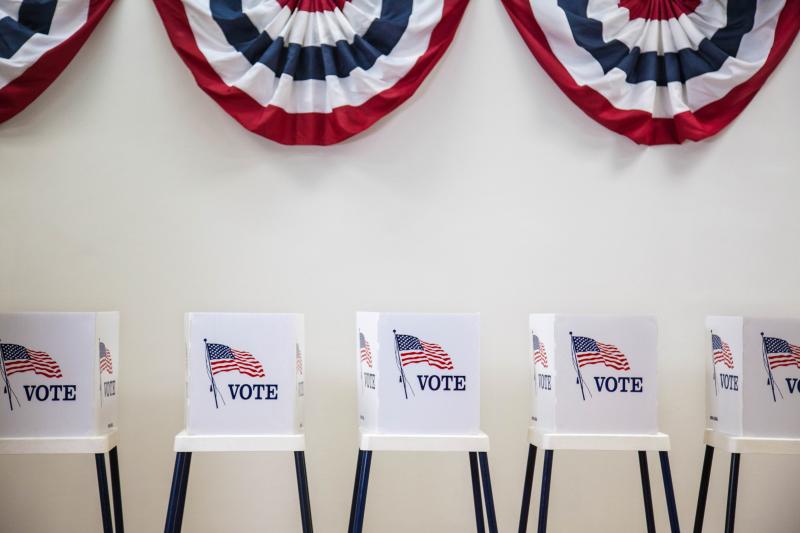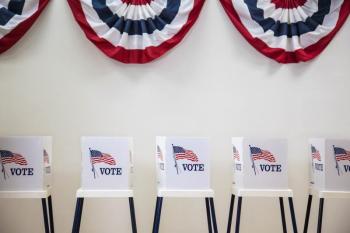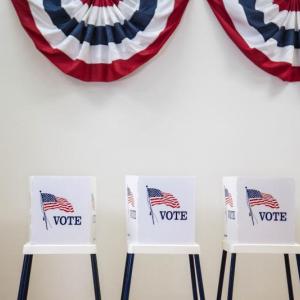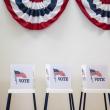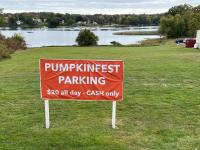How COVID-19 is impacting voter registration efforts ahead of November elections
MIDCOAST — With less than three months until the 2020 General Election, officials from both the Democratic and Republican parties are ramping up efforts to register new voters across the nation, including in the Midcoast ahead of a pair of heavily contested races including the U.S. Presidential race and Maine’s U.S. Senate race.
Those voter registration efforts, however, have been drastically altered amid the ongoing COVID-19 pandemic as the pandemic created a significant plunge in new voter registration numbers, according to one election data firm, and has forced one party to significantly alter their new voter registration plans.
New voter registration nationwide plummeted from 1.66 million in March to 194,596 in May, according to TargetSmart, a self-described Democratic political data and data services firm.
During the 2016 presidential election cycle, 1.49 million new voters were registered in May.
The data firm found, in a late June report, that prior to COVID-19, 59.34 percent of new registered voters in Maine were registering as democrats. Since COVID-19 began, however, 39.8 percent of new registered voters in the state were registering as democrats.
Knox County Democrats Events Chairperson Nancy Davis noted the group has been looking for creative ways to register voters amid the pandemic as Maine’s democratic officials has directed its county branches to not hold regular office hours or traditional registration activities.
“COVID-19 has definitely put a crimp on our activities, because we normally would have lots of things going on in our downtown headquarters, but now we must limit our activity,” said Davis.
The sessions are held Tuesdays and Saturdays outside the Knox County Democrats’ headquarters at 500 Main Street in Rockland from 2 to 6 p.m. Appointments can be made to meet with a party staffer outside those sessions if further assistance is required.
With a rising interest in absentee ballots across the nation and in the Midcoast, Davis is currently organizing a campaign to hold short outdoor sessions twice per week to register voters and answer questions about requesting absentee ballots, voting locations and election deadlines.
“It is difficult to figure out how to register new voters this year, in the midst of a raging pandemic,” noted Lincoln County Democratic Committee campaign coordinator Barb Burt.
Three strategies are being prioritized in Lincoln County including a peer-to-peer campaign that urges young registered voters to register their unregistered friends, new resident registration targeting individuals who have moved to Lincoln County but have yet to register to vote within the county, and a neighbor-to-neighbor campaign that provides volunteers with tools to help their neighbors and friends register.
The trio of registration initiatives in Lincoln County are part of the county committee’s annual theme, Connecting for Change.
“[W]e’re trying to make meaningful personal connections with voters (and nonvoters) who may not see themselves as members of the Democratic Party,” said Burt.
In Waldo County, Republicans have held several new voter registration functions following CDC guidelines with registration tables established to register individuals, according to Anne Kurek, the Waldo County Republican Committee’s secretary.
At the Belfast headquarters for the Waldo County Republicans, individuals stopping in are asked if they are a registered voter and are offered assistance to register.
“I really don’t think the pandemic has caused a problem with registering people,” Kurek responded when asked if the pandemic has impacted registration efforts for the organization.
The two political parties have taken drastically different approaches to registering new voters across the nation.
Republican campaign volunteers for Donald Trump told Politico earlier this month volunteers knocked on one million doors in the final week of July while the organization has plans to increase the number of volunteers knocking on doors by the end of September.
The campaign for Democrat Joe Biden, meanwhile, says it knocked on zero doors amid the pandemic and, according to Politico, “don’t anticipate doing anything more than dropping off literature unless the crisis abates.”
Democrats, instead, have focused their efforts nationwide on reaching out to voters via phone calls, text messages and writing letters.
The Maine branch for Swing Left — a group “organizing and empowering volunteers to make a difference in the most competitive [general election] races up and down the ballot that could help Democrats win control of an entire chamber of government,” according to a spokesperson — is conducting a phone call and letter writing campaign.
“The phone calls volunteers are making include conversations to persuade undecided voters to support Democratic candidates,” said Alex Pilla, Swing Left’s communications manager.
A large part of Swing Left’s work in Maine is ensuring Democrats who have recently moved to Maine receive a reminder from the organization to update their voter registration information to cast their ballot in Maine.
The organization’s volunteers have written nearly 50,000 letters, according to Pilla, to Mainers encouraging those eligible to participate in the November elections, and are focused, in Maine, on the Presidential race and Maine’s U.S. Senate race.
A group of U.S. Senators, including Maine’s Angus King, urged the U.S. State Department, in a July letter, to ensure that American servicemembers and citizens working or living overseas can seamlessly vote amid the pandemic.
“In the letter, the senators point out that travel and mail operations remain disrupted in many countries around the globe, threatening the ability of American servicemembers, diplomats, and citizens living abroad to be able to vote in the November 2020 election,” a news release stated. “They urge the Department to issue guidance to embassies and consulates on how to safely administer voting and ballot drop-off programs during the pandemic.”
Local chapters for the League of Women Voters of Maine traditionally hold voter registration drives at events, high schools, and even naturalization ceremonies. Those traditional events have been impacted, however, by COVID-19.
“The pandemic has limited our ability to conduct voter registration in that manner, so local chapters are working on adapting their voter registration efforts,” said Lane Sturtevant, an organizer for League of Women Voters of Maine and Maine Citizens for Clean Elections. “The Midcoast League is reaching out to local community organizations to organize outdoor tabling at food pantries and other locations. Local leagues are also able to train staff at community organizations to assist in voter registration or to provide organizations with voter registration cards, absentee ballot request forms, and other materials.”
A major concern for the League is how young, first time voters are able to register amid the pandemic since, as Sturtevant pointed out, Maine is one of the few states individuals cannot register to vote online.
“The pandemic has also made it nearly impossible for young, first time voters to register,” Sturtevant said. “In-school registration drives are not taking place and town offices have limited hours or been closed for months. So students are left to sort through information themselves, gather envelopes and stamps, access a photocopier or scanner, and register through the mail. Which means most don’t do it!”
To tackle the issue young voters face amid COVID-19, The League of Women Voters launched the Youth Votes, project enabling students to register, request a ballot and eventually vote without much effort.
“Our volunteers mail students everything they need: registration and ballot forms with clear instructions, and even a stamped envelope pre-addressed to their town clerk,” Sturtevant explained. “Schools provide envelopes on school stationery addressed to students of voting age, and a cover letter signed by the school official. The student can then use the envelope from the school as proof of residency for their town clerk — no photocopying or scanning needed.”
The project and its method has been approved, according to Sturtevant, by the Maine Secretary of State, and pilot programs at four Portland area high schools and Southern Maine Community College yielded successes ahead of the March primaries.
The November elections project has so far seen 10 high schools and five charter schools partner with the League for the initiative as well as three community colleges providing a project reach of 12,000 students with efforts to sign more schools up for the project underway.
Locally, Medomak Valley High School in Waldoboro has joined the project.
Event Date
Address
United States

